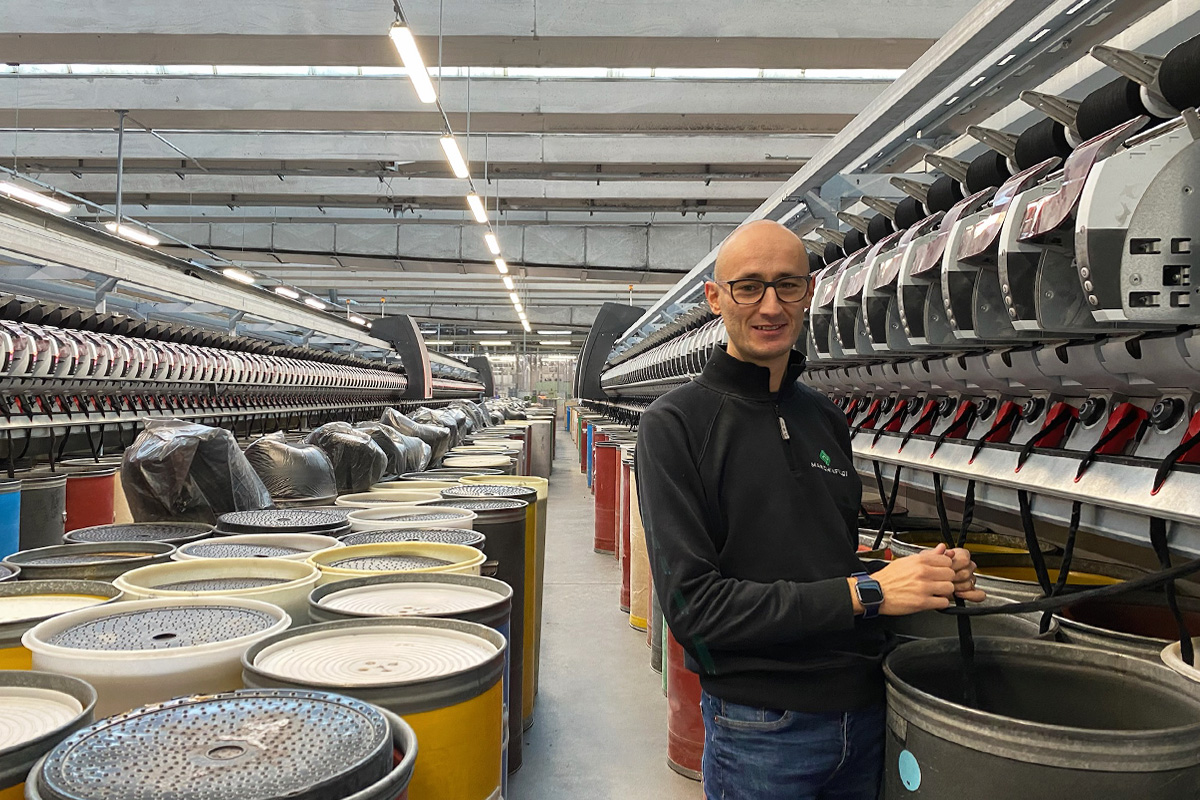Quality control is an essential function in various steps of our work and it guarantees the qualitative standards of our yarns. Let’s talk about it with Alessandro Rostellato, Quality Control Manager of our Group.
Hello, Alessandro, can you explain to us in short what your job is? At which stages of the yarn production does your work come into action?
I am responsible for the quality of all the yarns produced by the Marchi & Fildi Group. In fact, my job is to guarantee that all of our products observe the quality standards we have set ourselves and which we want to guarantee to the markets.
In particular, in the first stages of production, the work of the whole team in the Quality Laboratory is fundamental: in the preparation of the fibres, specifically during carding, it is vital to verify that the quality is appropriate for our yarns and comply with the data sheets for the articles.
During the following stages, I get involved to check progress in the production line, always from a Quality point of view.
Checking the finished product, as the last step, is carried out by means of technical analyses and visual checks and regarding this, I would like to underline how the visual factor, alongside the tactile factor, represents another fundamental element in our sector, especially for the articles destined for the fashion world.
What type of education and training brought you to this role? And how do you keep up to date?
I graduated from high school as a textile expert from Itis in Biella in 2003.
I immediately started to work in a spinning mill in the Biellese region, and in 2016, I joined the Marchi & Fildi Group. I have become extremely passionate about the production of yarns; as a result of my experience in the field, I have furthered my knowledge regarding the production processes of various types of yarn, and in relation to different end-uses: yarns for weaving and knitting, produced for the fashion world, or the technical sector, which I took up responsibility for last year.
Finally, I often visit our end customers, which allows me to acquire further skills and knowledge, and to better understand Quality issues.
Working in a Group like ours, that uses fibres for yarns with different uses, what has this taught you? What challenges does it bring with it?
Let’s start with the assumption that I have the possibility of learning something new every day, and that is including any mistakes! At the outset of my career, I was mainly responsible for classic fibres such as cotton and linen. When I joined this Group, I was able to learn the principles involved in recycling, thus increasing my competence and my experience. Then I moved to the world of the Filidea Technical Yarns performant fibres and the more sought-after fibres offered by the Filidea brand.
My role also enables me to work in close contact with the Quality and Production departments of the Turkish facility that also belongs to the Group. Being part of an international team and working in a multicultural context is very important because it gives you the opportunity of opening your mind and having a wider vision of the working methods. The experience of the Turkish team is particularly important with regard to technical yarns, and this helps me to increase my own knowledge.
As a result of my experience within the R&D department, I have become more proactive and have a longer-term vision in relation to the customised developments for individual customers.
In general, my work is very challenging and this is the aspect which gives me the most drive and motivation in order to make improvements.
How do you see the future of the textile supply chain in relation to the quality requirements of your customers?
The quality is always more oriented towards the specific requirements of the customers, with all the issues and the personalization which this brings with it. We set ourselves increasingly high standards internally in order to best position ourselves in comparison with non-EU countries, in particular in relation to the recycled products and in general all the yarns produced. The aim is to try to constantly raise the quality standards, making important investments both in financial terms, but also in terms of employees.
The subject of recycling is becoming more and more central to the future strategies of the brands, who often interface with us in order to develop projects related to circular economy.
Finally, the requests from the supply chain require us to maintain and guarantee very high standards, ensuring these as a result of the training and the commitment of the whole Group in relation to this focus.



![Pop, sostenibile, irresistibile 💋
L’autunno/inverno 25-26 delle collezioni Marchi & Fildi e Filidea è tutto da scoprire. Tra le novità potrai esplorare articoli e titoli nuovi, cartelle colori rinnovate e l’ampliamento dell’offerta in stock service.
Lasciati ispirare dai nostri filati innovativi e, se non ci siamo incontrati durante l’ultima edizione di @pittimmagine Filati, scopri tutti i dettagli delle nuove collezioni nel nostro articolo di approfondimento
[LINK IN BIO]](https://www.marchifildi.com/wp-content/plugins/instagram-feed/img/placeholder.png)